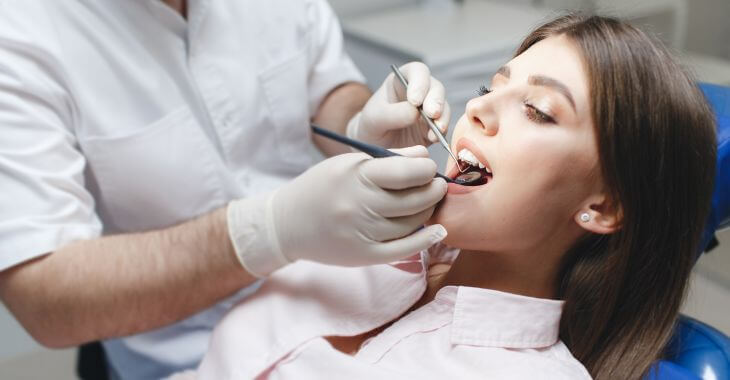Effects of Mouth Breathing: Face, Dental and Health Consequences

Most people take breathing for granted. It is automatic – breathing is controlled involuntarily by the brain stem, but it can also be controlled by voluntary muscle function. Breathing is essential, but how you breathe can impact your health. Nasal breathing is the ideal way to inhale and exhale, but some people breathe through their mouth. Mouth breathing can have an effect on your health, including your dental health and facial structure. Here is what you need to know about mouth breathing and why it can be bad for your health.
Why Is Mouth Breathing Bad?
Your nose is designed for breathing. The nasal passages contain moist membranes and cilia (small hairs) that humidify and filter the air you breathe in before it goes into your lungs. Nasal breathing tends to include deeper breathing for improved diaphragm function. While you can breathe through your mouth, it can cause a variety of issues. It can dry out your mouth, impact oxygen levels, affect jaw/facial structure and cause dental problems. Other impacts of mouth breathing: face distortion, bad breath and sleep apnea/snoring.
What Causes Mouth Breathing?
There are a few different reasons someone may become a mouth breather. Often, it begins in childhood and becomes a habit, but it can be caused by physical issues or health conditions at any age. Some of the possible causes of mouth breathing include:
- Congenital defects such as tongue-tie, cleft palate
- Deviated septum, narrow jaw size and smaller nasal passages
- Allergies, asthma and upper respiratory infections
- Thumb or finger sucking
- Enlarged tonsils
- Sleeping on back
Mouth breathing may start to overcome an obstruction in the nasal passages and become habit. This can start in childhood and become a life-long problem if it is not purposely addressed. As more is learned about the serious impacts of mouth breathing on health and appearance, the more important it is to control this behavior. Learning the health consequences and how to stop mouth breathing can benefit children and adults.
Health and Appearance Problems Caused by Mouth Breathing
Mouth breathing is considered a preference by some, but it can have a detrimental affect on health and appearance. Everything from your teeth, gums and jaw to your brain and body function can be impacted by mouth breathing. It is even more crucial in children who are still growing and developing. Some of the health and appearance consequences of mouth breathing include:
- Dental problems. Breathing through the mouth causes oral dryness. This increases bacteria that can cause tooth decay and gum disease. Salvia helps neutralize bacteria acids and helps remove food debris from the mouth. It can also affect teeth and jaw alignment, resulting in malocclusions and difficulty maintaining good oral hygiene.
- Bad breath. The same bacteria and food debris that cause dental problems can cause bad breath. Dry mouth is a common cause of chronic bad breath, or halitosis.
- Cognitive and behavioral health. Low oxygen levels from mouth breathing can impact focus, cognitive ability and behavioral function, especially in children.
- Jaw and face structure. “Mouth breathing face” is a combination of impacts to the face structure, especially in children. A receded jaw/chin, crooked nose, jaw misalignment, narrowed face and other structural changes can occur.
- Sleep apnea. Mouth breathing can contribute to a narrow airway and sleep apnea, which can cause serious health problems.
Something as simple as mouth breathing can cause a plethora of health problems and change the facial appearance. Children who begin mouth breathing early may be facing years of dental and orthodontic treatments and may have structural changes to their face. Adults also can suffer health consequences to their cardiovascular and nervous system, as well as their appearance and dental health.

How to Stop Mouth Breathing
In many cases, mouth breathing begins due to a problem within the nasal passages. The first step to overcoming mouth breathing is enabling easy nasal breathing, Controlling asthma, allergies and chronic upper respiratory illnesses can allow for nasal breathing. Fixing structural problems like a deviated septum or narrow nasal passages can also help enable nasal breathing.
In some cases, mouth breathing is a habit, which needs behavioral changes. This starts with focusing on nasal breathing when awake, which can improve nasal breathing at sleep. Sleeping on your side can help minimize mouth breathing and your dentist may recommend wearing a dental mouthguard to control jaw position. For chronic mouth breathing, treatment through an ear, nose and throat specialist, your doctor or dentist can be helping to train you and or child to become a nasal breather.
Mouth breathing can have many negative impacts on health, teeth and facial structure. If you are a mouth breather or you notice your child is snoring or breathing through their mouth, talk to your doctor or dentist about how to stop mouth breathing. Making this small change can have a significant impact on dental and overall health, as well as appearance.
The information provided on this website, including text, graphics, images, and other materials, is intended solely for informational purposes and should not be used as a substitute for professional medical advice, diagnosis, or treatment.



)